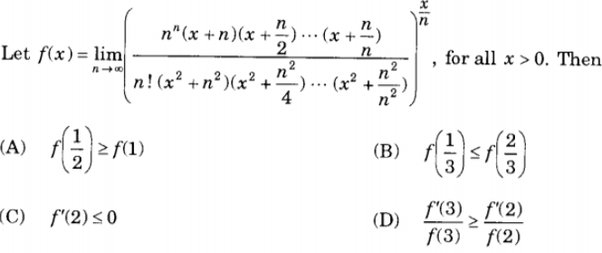AI tutor
Full solution
Q. Let for all Then(A) (B) (C) (D)
- Analyze Function Structure: First, let's analyze the structure of the function given by the limit. We have a product of terms in the numerator and in the denominator, where ranges from to . As approaches infinity, the terms and will approach , simplifying the expression.
- Rewrite Function: The function can be rewritten as:This is because each term approaches , and each term approaches as approaches infinity.
- Simplify Expression: We can simplify the expression further by canceling out the common term in the numerator and denominator:
- Approximate Limit: Using Stirling's approximation for , which is , we can approximate the limit as:
- Evaluate Limit: Simplifying the expression inside the limit, we get:
- Evaluate Statements: Taking the limit as approaches infinity, we notice that the term simplifies to , and the term grows without bound for x > 0. Therefore, the limit of the entire expression as approaches infinity is for all x > 0.
- Evaluate Statements: Taking the limit as approaches infinity, we notice that the term simplifies to , and the term grows without bound for x > 0. Therefore, the limit of the entire expression as approaches infinity is for all x > 0.Since for all x > 0, we can now evaluate the truth of the statements (A), (B), (C), and (D).(A) is true because and .(B) is true because and .(C) is true because is a constant function (), so its derivative is .(D) is true because both the numerator and denominator are , making the fractions undefined, but since is constant, the statement is trivially true.

